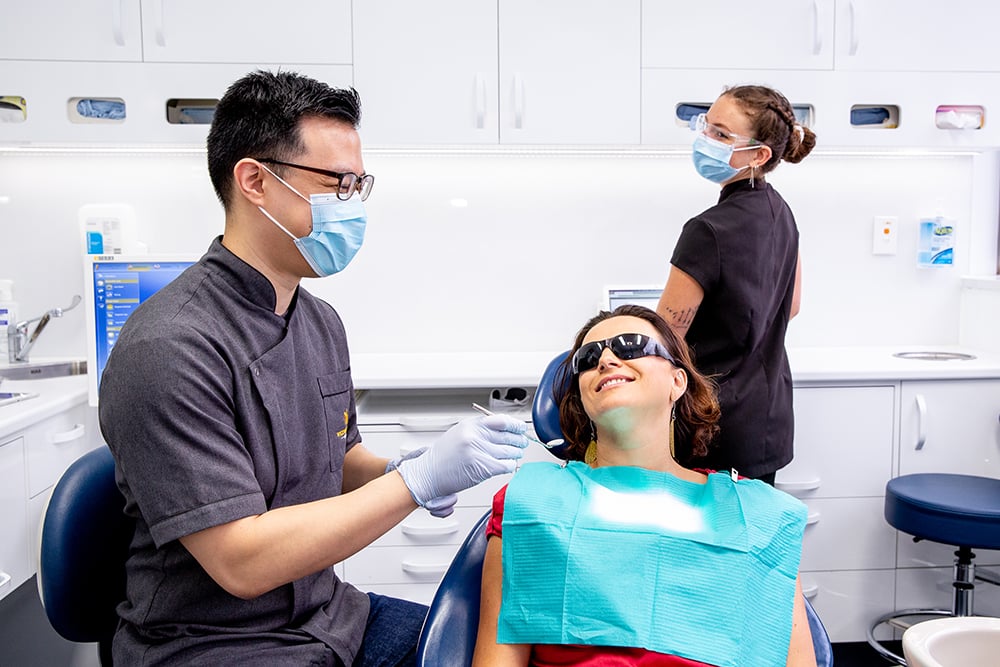Do I really need to see the dentist every six months?
The benefits of regular oral health checkups
As the cost of living seems to rise more and more, Australians everywhere are cutting back in many areas to try and make their dollars stretch further.
And as you take a hard look at where the household budget can be trimmed, it’s understandable if you think you can save money by forgoing a trip to the dentist. But does it really make sense, both financially and health-wise?
In this blog, the Wickham Terrace Dental team will take a look at whether skipping six monthly preventive dental checkups is really the way to save money – or if it really leads to bigger costs as any oral health problems become bigger in the future.
What dental problems can occur without regular checkups?
Without the professional care and attention from your dentist twice a year, there are quite few oral health issues which can pop up.
Tooth decay
Though you might not think this is an issue for you, in fact the important thing to remember is that tooth decay often isn’t painful – until it advances and hits a nerve! So you just won’t know that you have a problem with tooth decay until it’s too late.
Seeing a dentist every six months helps to identify the early signs of tooth decay, and allows us to put a treatment plan in place before the problem becomes more severe. We may be able to address your tooth decay before a filling is needed – for example, by advising you on better at-home oral health routines such as better flossing of a ‘food trap’ area in your teeth.
By detecting tooth decay early, the Wickham Terrace Dental team can help prevent a lengthy and expensive restoration process such as Root Canal Therapy, a crown, or even a dental implant if you need a tooth extracted thanks to advanced decay.

Gum disease
If you experience pain in a tooth when biting or chewing, you may have a problem with the health of your gums. Periodontal disease can take hold when plaque builds up on your teeth and gums, causing redness, inflammation, and pain.
When left untreated, this gingivitis can develop to become advanced gum disease or periodontitis, causing bad breath, receding gums, extreme pain when eating, and even tooth loss.
At your regular dental checkups, your dentist will check for signs of periodontal disease to diagnose and treat the problem in its early stages, before it progresses to the more serious gingivitis or periodontitis.
Oral cancer
One of the most serious dental health problems is oral cancer, which can be caused by poor oral hygiene, tobacco and alcohol use, sun exposure, a poor diet, some medicines, or the simple process of ageing.
Early detection of oral cancer can give a better chance of survival than when the disease is more advanced – a very good reason to see the Wickham Terrace Dental team regularly.
What happens at a regular preventive dentistry appointment?
At your routine dental visit, the Wickham Terrace Dental team will begin with a ten-point oral cancer check. We then conduct a thorough examination of your mouth, gums and teeth, checking for any signs of damage or loose fillings, and compare your mouth’s condition to your last appointment with us.
Our team will then carry out a thorough professional clean of your teeth to eradicate the built-up calculus that your brushing can’t remove, to help guard against gum disease.
Lastly but very importantly, we will carefully check for any problems or signs of other oral disease, so that we can treat them straight away.
Along with your regular visits to our Brisbane city dental practice, you can perform your own preventative dental care with a good quality oral hygiene routine at home.

Brush up on your daily oral hygiene routine
You’re probably well aware of the importance of brushing your teeth twice every day – morning and night. But are you fully confident that you know the correct technique for the best oral hygiene?
We recommend choosing a soft bristled brush to avoid damaging your tooth enamel. Brush gently at a 45 degree angle using a circular motion, and take care to brush each surface of every tooth, as well as along the gum line. It should take around two minutes to completely brush your teeth.
Once your brushing is complete, it’s very important to complete your daily oral hygiene routine by carefully flossing your teeth. Because your brush can’t fully reach into the tight spaces between your teeth, flossing is the only way to remove the built-up plaque in these areas, that can otherwise eventually cause gum disease.
Find out more about preventive dental appointments
Don’t wait until any dental problems become more serious – and more expensive to treat. Get in touch with the Wickham Terrace Dental team on 3831 3031 or contact us online now.
![Wickham-logo_[RVSE]-HORIZ-024_NEW_BP-web](https://latestnews.wickhamterracedental.com.au/hubfs/Wickham-logo_%5BRVSE%5D-HORIZ-024_NEW_BP-web.png)

